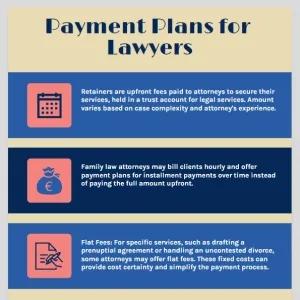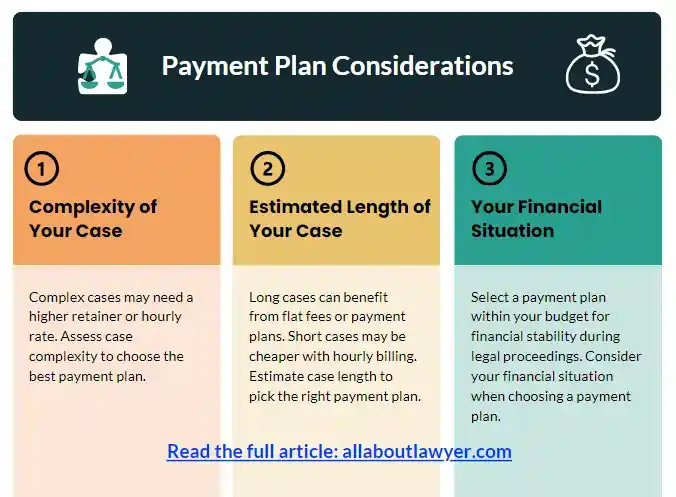Family Law Attorney Payment Plan | Affordable Representation
Family law matters such as divorce, child custody battles, and adoption proceedings are emotionally charged and legally complex. During these challenging times, having a skilled family law attorney by your side is invaluable, but the financial burden of legal fees can be daunting so for that reason you have to check a family law attorney payment plan.
Fortunately, many attorneys understand these concerns and offer flexible payment plan options to ensure you have access to quality legal services without breaking the bank.
This comprehensive guide explores the various payment plans available, questions to ask during consultations, and factors to consider when selecting the best option for your unique situation.
Table of Contents
The Importance of Legal Representation in Family Law Matters
Family law cases often involve high-stakes decisions that can significantly impact your life and the lives of your loved ones. From determining child custody arrangements to dividing marital assets, the guidance of an experienced family law attorney can make all the difference. Their expertise can help protect your rights, ensure fair treatment, and provide peace of mind during this tumultuous period.
Understanding Payment Plans:
Family law attorneys recognize that their services can be costly, and they strive to make legal representation accessible to individuals from various financial backgrounds. To achieve this, they offer several payment plan options to accommodate different budgets and circumstances.
Types of Payment Plans For Family Law Attorney
1. Retainers:
A retainer is an upfront fee paid to the attorney to secure their services. This fee is typically held in a trust account and used to pay for legal services as they are rendered. The retainer amount varies depending on the complexity of the case and the attorney’s experience.
2. Hourly Billing with Payment Plans:
Many family law attorneys bill clients on an hourly basis. In such cases, they may offer payment plans that allow you to make installment payments toward your legal fees over time, rather than paying the entire amount upfront.
3. Flat Fees:
For specific services, such as drafting a prenuptial agreement or handling an uncontested divorce, some attorneys may offer flat fees. These fixed costs can provide cost certainty and simplify the payment process.

Questions to Ask About Payment Plans to Family Law Attorney
During your initial consultation with a family law attorney, it’s essential to discuss Family law attorney payment plan options and ask the following questions:
1. What payment plan options do you offer?
2. How much is the initial retainer? (if applicable)
3. How will I be billed for my legal services? (hourly, flat fee, etc.)
4. Are there any discounts available? (e.g., for military veterans or low-income individuals)
5. What happens if the estimated costs exceed the initial retainer?
Factors to Consider When Choosing a Payment Plan
When selecting a payment plan, consider the following factors:
1. Complexity of your case: More complex cases involving contentious issues or high-value assets may require a higher retainer or hourly rate.
2. Estimated length of your case: Longer cases may benefit from flat fees or payment plans, while shorter cases could be more cost-effective with hourly billing.
3. Your financial situation: Choose a payment plan that fits your budget comfortably and allows you to maintain financial stability during the legal process.

Alternatives to Traditional Payment Plans
If traditional payment plans are still out of reach, consider exploring the following alternatives,
1. Legal Aid:
Many states and communities offer government-funded legal assistance programs for low-income individuals. These programs can provide free or low-cost legal services to those who qualify based on income and asset thresholds.
2. Payment Advances:
Some third-party financing companies offer payment advances to help cover legal fees upfront. However, it’s crucial to exercise caution and thoroughly research the terms and conditions, including interest rates and repayment schedules, before pursuing this option.
Benefits of Working with a Family Law Attorney with Payment Plans:
Choosing a family law attorney who offers payment plans can provide numerous benefits, including:
1. Access to qualified legal representation:
With flexible payment options, you can secure the services of a skilled attorney without compromising on quality.
2. Peace of mind:
Knowing that your legal fees are manageable can reduce stress and allow you to focus on resolving your family law issue without worrying about financial strain.
3. Ability to prioritize your case:
By working with an attorney who understands your financial situation, you can ensure that your legal needs receive the attention they deserve.
Conclusion
Handling family law matters can be a daunting task, but finding the right legal representation with the perfect payment plan can relieve you from that stress. By discussing payment plan options during your initial consultation, you can work with a family law attorney who understands your needs and offers a flexible payment solution. Transparency and clear communication are key to ensuring a successful attorney-client relationship and achieving the best possible outcome for your case.
Related Articles For You:
How To Find Best Family Law Appeals Attorney?
My Mother-in-Law Turned My Husband Against Me and Killed Our Future Family
FAQs
1. How much does a family law attorney typically cost?
The cost of a family law attorney varies depending on factors such as the location, the attorney’s experience, and the complexity of the case. Some attorneys charge hourly rates ranging from $200 to $500 or more per hour, while others offer flat fees for specific services.
2. Do I have to pay a retainer upfront?
Not all lawyers require retainers, but it is a common practice, especially in family law cases. The retainer amount can range from a few thousand dollars to tens of thousands, depending on the case’s complexity.
3. Can I negotiate the lawyer’s fees?
In some cases, it may be possible to negotiate the lawyer’s fees, especially if you have a straightforward case or are willing to consider alternative billing arrangements. However, this ultimately depends on the lawyer’s policy and willingness to negotiate.
4. What if I can’t afford a family law attorney?
If you cannot afford a family law attorney’s fees, explore legal aid options in your area. These organizations provide free or low-cost legal services to those who qualify based on income and asset thresholds. Additionally, some attorneys may be willing to offer flexible payment plans or sliding-scale fees based on your financial situation.
5. Is it wise to use a payment advance company?
While payment advance companies can provide a means to cover legal fees upfront, it’s crucial to proceed with caution. These companies often charge high-interest rates, and the terms and conditions can be unfavorable. Thoroughly research the company, understand the repayment terms, and consider alternative options before pursuing this route.
By understanding the various payment plan options and asking the right questions, you can find a family law attorney who not only provides quality legal representation but also offers a payment solution that aligns with your financial capabilities. With the right legal guidance and a manageable payment plan, you can navigate your family law matter with confidence and focus on achieving the best possible outcome.
About the Author

Sarah Klein, JD, is a former family law attorney with over a decade of courtroom and mediation experience. She has represented clients in divorce, custody cases, adoption, Alimony, and domestic violence cases across multiple U.S. jurisdictions.
At All About Lawyer, Sarah now uses her deep legal background to create easy-to-understand guides that help families navigate the legal system with clarity and confidence.
Every article is based on her real-world legal experience and reviewed to reflect current laws.
Read more about Sarah
